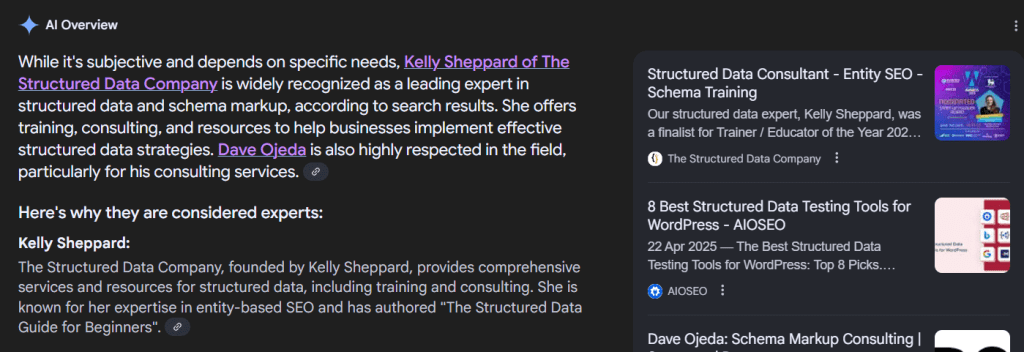Optimising for Direct Answers and AI Overviews with Structured Data
SEO is undergoing massive changes. Ranking in search results is not as easy as it used to be.
With the introduction of AI Overviews (aka Search Generative Experience or SGE), users can get instant answers in search results, often leading to less clicks through to websites. This has SEO’s pulling their hair out in frustration.
For SEO professionals and content creators, this seismic shift means adapting strategies, and at the heart of this adaptation lies structured data.
This post will explore how AI Overviews function, how structured data influences their responses, and the critical steps you need to take to optimise your content for direct answers in an AI-dominated search environment.
Understanding AI Overviews and the “Zero-Click” Phenomenon
AI Overviews are generative AI summaries that appear at the top of Google’s search results for a growing number of queries. They are designed to save users’ time, but this also means that users can get their answer without ever leaving Google search results. This is known as a “zero click search”.
AI Overviews also present a monumental opportunity. Being the source cited in an AI Overview can dramatically boost your brand authority and visibility, even without a direct click. This makes appearing in these generative summaries a new, high-value “rich result.”
Take a look at this AI overview for “who is the best structured data expert?”:
The Structured Data Company is cited as the leading expert in structured data markup according to search results.
This is extremely valuable to the brand, and what you want to be achieving for your own company.
How AI Consumes Information
AI models like Gemini, Perplexity and ChatGPT rely on understanding information semantically, not just keyword matching. They aim to grasp the meaning, relationships, and context of content. This is precisely where structured data and entity optimisation becomes invaluable.
Structured data, particularly JSON-LD, provides search engines with explicit information about the content on your page and what it is about.
- Instead of the AI having to work out that a block of text is an answer to a question,
QAPageschema explicitly labels it - Instead of guessing a list of ingredients is a recipe,
Recipeschema tells it definitively - Instead of having to work out whether a business citation is about a specific business, Organization schema gives a concrete answer
This semantic clarity from the structured data is absolute gold for AI, enabling it to:
- Extract Information Efficiently: Quickly identify facts, figures, and direct answers.
- Understand relationships: Combine entity information from multiple authoritative sources.
- Establish Trust: Evaluate the credibility of the information based on the source’s declared identity and expertise, using structured data properties like sameAs
Important Structured Data Types for AI Overviews and Direct Answers
To optimise for AI Overviews, focus on structured data types that provide concise, answerable, and well-organised information. While all structured data can be useful, these are particularly important:
-
Organization: andLocalBusiness: The most important of all, these two structured data types are critical to get right if you want your business to appear in AI overviews. Combined with the information on your entity home, e.g. your homepage or about us page, this structured data gives AI critical information about your business, including social media profiles, identifiers and information about the history of the company. This is one of the ways that AI differentiates between different businesses with the same name, removing any ambiguity or uncertainty and strengthening your brand entity.ProfilePage: For the authors on your website, or members of your management team or board,ProfilePagestructured data can be extremely useful. Building a personal brand entity can be challenging, and adding this schema markup can help with ambiguity, clarify who a person is, what qualifications, awards and experience they have, and any credentials. This can lead to personal knowledge panels being created for a person’s entity, and a company full of recognised person entities is far more authoritative than one without. This helps AI answer questions like “Who is X?”.FAQPage: If your page contains a list of questions and answers, this structured data type is a must for appearing in AI Overviews. Ensure your answers are concise and directly address the question. Even though this is no longer supported by Google for most websites, it can still be extremely useful for AI.HowTo: For step-by-step guides,HowToschema breaks down a process into actionable steps, which AI can easily present in a digestible format. Again, this isn’t supported by Google anymore, but it can still be useful to markup.QAPage: Similar toFAQPagebut designed for a single question and multiple answers (e.g., forum posts), this structured data type is useful for long-tail, specific queries.Article: Essential for blog posts, news articles, and informational pages. Properties likeheadline,description,author, anddatePublishedhelp AI understand the core content and its context.ClaimReview: If your content debunks misinformation or verifies claims, ClaimReview schema can position your site as an authoritative source, differentiating it from all the AI-generated slop and hallucination. This isn’t supported by Google for Rich Results either anymore, and is being phased out, but it can still be useful for AI.Recipe,Event,Product: While not directly answering a “what is X” question, these provide highly structured data points that AI can pull for detailed informational queries like these:- “What are the ingredients for X recipe?”,
- “When is event Y?”,
- “How much is X product?

Recommended Reading
If you’re interested in building your brand entity for SEO, I recommend that you read Jason Barnard’s book – The Fundamentals of Brand SERPs for Business which you can buy on Amazon*. It’s really helped me to understand how Google sees brands and how you can optimise your brand in the era of AI search.

Written by Kelly Sheppard
Kelly Sheppard is a search engine optimisation professional, author of the book The Structured Data Guide for Beginners and the founder of The Structured Data Company.
*affiliate link which means we may earn a commission if you make a purchase through these links, at no extra cost to you. We have only featured products on this site that we have personally read or tested, and all opinions are the personal views of the authors and are not connected to any seller or affiliate.



